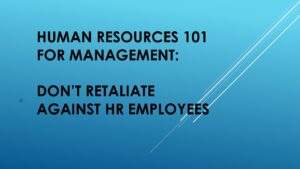 In his “Letter from a Birmingham Jail”, Martin Luther King Jr. wrote that “whatever affects one directly, affects all indirectly.” Such is true with employment discrimination. We often think that discrimination affects only the victim, but we often forget that society as a whole is ultimately affected.
In his “Letter from a Birmingham Jail”, Martin Luther King Jr. wrote that “whatever affects one directly, affects all indirectly.” Such is true with employment discrimination. We often think that discrimination affects only the victim, but we often forget that society as a whole is ultimately affected.
Case in point, I recently participated in an arbitration where I represented a former upper management official employed with a healthcare provider. My client was unexpectedly terminated despite a good employment history and no prior discipline. She did, however, have to endure a male supervisor who was intimidating, disrespectful and condescending to her and other female employees. He also made several negative gender based comments. In addition to terminating my client, another female was forced to resign under his threat of termination, and a third resigned due to hostile working conditions created by him.
All three female employees voiced complaints about this supervisor’s unprofessional behavior. Human resources was notified, but failed to perform the most basic of investigations. No statements were taken from the female employees, no witnesses were interviewed, and the alleged discriminator was not even notified of the complaints against him. While the company had nicely written policies proclaiming a zero tolerance for discrimination, and pledged that all complaints would be promptly and thoroughly investigated, nothing was done. Why is that? Perhaps human resources was indifferent to the complaints of females employees. Perhaps there was a “good old boy network” in place (and in fact the upper level human resources officials were male). Or perhaps the perceived “value” of this discriminator to the company outweighed any potential liability he might create by his discrimination.
During the course of preparing for this arbitration, I attempted to contact several former employees who either experienced or were witnesses to this alleged discrimination. While some agreed to cooperate, others failed to respond to my inquiries. Unfortunately, this type of indifference creates a fertile ground of discrimination to not only live, but to breed. It is the same indifference I see from people who are too busy to go to jury duty. These are the people who put their personal needs over the problems of others . . . until it happens to them.
As a result of the discrimination of one man, and the unresponsiveness of human resources, three caring, compassionate and very competent female employees left this organization. So why should we care? This organization cares for many elderly patients. Patients like our parents and grandparents. Patients who are unable to walk or stand on their own, or who are unable to eat without the assistance of caring and compassionate workers. At the end of the day, the care and safety of these patients are compromised because good workers are forced out by unlawful conduct that should never have been tolerated in the first place.
This is why we should care about discrimination in the workplace. As Dr. King wrote in the same letter, “Injustice anywhere is a threat to justice everywhere.”





